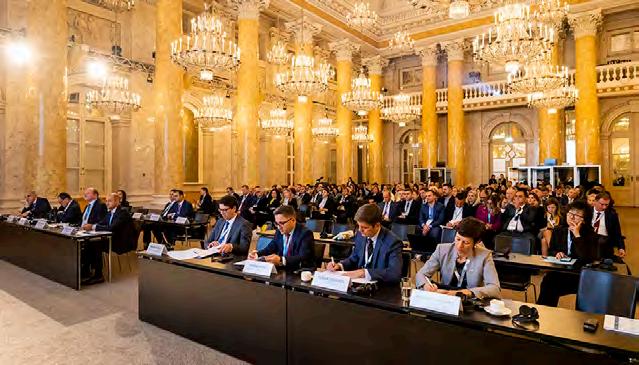
6 minute read
AUSTRIA AS A PARTNER
Foreshadowing Austria’s imminent partner status, the 1961 Annual Meetings of the International Monetary Fund (IMF) and the World Bank were held in Vienna. It was in the same year that Austria joined the newly established lending arm of the World Bank—the International Development Agency (IDA). Only sixteen years after the war had left the country devastated and dependent on foreign aid, Austria was able to support the poorest countries in the world through IDA.
Austria’s rapid evolution from borrower to partner was paralleled by the significant development of the Bank itself. As the institution grew to what is the World Bank Group (WBG) today, Austria’s support and engagement helped shape the design and policies of these institutions. After it joined the IBRD in 1948, Austria’s journey to become a full-fledged member of all five WBG institutions was completed in 1997.
Advertisement
International Development Association (IDA)
IDA was launched in 1960 and Austria joined in 1961 to support IDA’s mission to provide financial support to the 75 poorest countries in the world. Lending money on concessional terms, IDA is the single largest source of donor funds in the world and supports a wide range of development activities such as primary education, basic health services, clean water and sanitation, agriculture, business climate improvements, infrastructure, and institutional reforms. Austria is one of IDA’s most generous partners on a per capita basis.
International Finance Cooperation (IFC)
Having been a founding member in 1956, Austria’s partnership with IFC, the World Bank’s private sector arm, is especially strong. As the largest global development institution focused on private sector investment, IFC provides loans, guarantees, equity, advisory services, and mobilizes additional capital from other sources to stimulate private sector investment in developing countries. Among the ten most active countries in IFC, Austria has supported successful projects to promote renewable energy generation and distribution, to strengthen more sustainable production methods, and to increase productivity in agribusiness.
International Centre for Settlement of Investment Disputes (ICSID)

ICSID was established in 1966 and Austria became a member in 1971. ICSID is the leading institution devoted to international investment dispute settlement.
Multilateral Investment Guarantee Agency (MIGA)
MIGA was established in 1988 and Austria joined in 1997. The agency provides political risk insurance and credit enhancement to investors and lenders to facilitate foreign direct investment in emerging economies.
Vienna as an ECA regional operations hub
Austria is a trusted and long-standing member of the WBG. This partnership was further strengthened with the establishment of a WBG presence in the country’s capital. What started with the Federal Ministry of Finance’s hosting of the Center for Financial Reporting Reform as well as the Investment Climate Advisory Services (FIAS) Program in 2007 evolved into an operational hub with over 250 Vienna-based staff members. In addition, following Russia’s invasion of Ukraine, the Vienna office has been hosting part of the WBG’s staff originally based in Kyiv since February 2022.
“Our partnership with the World Bank Group has grown steadily over time. A highlight is the establishment of the World Bank Group’s office in Vienna with the support from the Austrian Government. We are proud to host this hub which provides critical support to the Europe and Central Asia Region not only to the public, but also to the private sector.”
—Magnus Brunner, Federal Minister of Finance, 2023
2007
» Centre for Financial Reporting Reform
» Investment Climate Advisory Service
2011
» Financial Sector Advisory Center
2013
» Danube Water Program
» Office of the Western Balkans Director
2017
» IFC regional hub for Europe
2019
» GovTech Global Partnership
» Regional IMF unit for the Western Balkans
2022
» ECA Cities and Climate Change Program
» Green Recovery Program for the Western Balkans
Programs administered from the WBG Vienna Office and supported by the Federal Ministry of Finance
The Investment Climate Advisory Services (FIAS) Program was originally established to deliver targeted investment promotion activities to attract foreign direct investors to the Western Balkans. With its close relationship with the region, rooted in shared history, Austria is considered a lead investor in the Western Balkans. Since its establishment in Vienna in 2007, the program continuously expanded its thematic scope and geographic coverage. Today, FIAS serves as a specialized center of expertise for integrated investment climate and business environment solutions for clients in the Europe and Central Asia (ECA) and Middle East and North Africa (MENA) regions.
“Not only have we embraced the knowledge and procedures designed during the Western Balkans Regional Investment Policy and Promotion program, but we have also made them part of our standard activities, with specific personnel and budgets allocated for these activities on an annual level.”
—Endrit Shala, Minister of Trade, Kosovo
—Rados Gazdic, Director, Development Agency of Serbia

The Centre for Financial Reporting Reform (CFRR) supports financial management advisory, public sector accounting, and corporate financial reporting reforms in the ECA region. The work includes regional capacity building and peer learning programs, country-level technical assistance projects as well as diagnostic and analytical work. With the establishment of a presence in Vienna in 2007, CFRR has helped over 24 countries across ECA to bolster economic growth and attract private sector investment through transparent and accountable financial reporting. Through various regional and country programs, CFRR has made a major impact in the ECA region over the years by disseminating over 130 publications, conducting over 300 workshops, and training over 53,000 professionals. CFRR has also extended its global reach and is currently also helping to support accounting professionals in Africa.
“I am happy to express my gratitude towards the World Bank, and CFRR projects in particular, for supporting us from the very beginning of these reforms, helping us in many different areas, like drafting EU-aligned laws and regulations, and funding numerous workshops, trainings, and events to strengthen accounting and the audit profession in Georgia.”
—David Mchedlidze, Head, Service for Accounting Reporting and Auditing Supervision, Georgia
Following the global financial crisis, the Financial Sector Advisory Center (FinSAC) was established with the aim to strengthen banking supervision, bank resolution, and financial sector crisis management. FinSAC supports eligible ECA countries through bilateral technical assistance; knowledge sharing workshops, seminars and conferences; and regional policy-oriented analytical work. FinSAC cooperates closely with a wide range of external partners including the European Commission, European Central Bank, European Banking Authority, universities as well as the Austrian authorities— Ministry of Finance, National Bank, and Financial Market Authority.


“The FinSAC experts have demonstrated admirable competence, thoroughness, and dedication. […] They have managed to adjust the technical assistance provided to our needs and circumstances.”
—Milica Arnaudova Stojanovska, Advisor to the Governor of the National Bank of North Macedonia, 2021
The next important addition was the launch of the Danube Water Program (DWP), jointly run by the World Bank and the International Association of Water Service Companies in the Danube River Catchment Area (IAWD). Together with local, national and regional stakeholders, the program works on achieving smart policies, strong utilities, sustainable water services, and a water-secure and resilient Danube region. The Program spans sixteen countries, with eleven target countries eligible for funding: Albania, Bosnia and Herzegovina, Bulgaria, Croatia, Kosovo, North Macedonia, Moldova, Montenegro, Romania, Serbia, and Ukraine. Since its launch, more than 1,200 sector professionals have benefited from cross-country capacity-building programs, eight different training programs for water utility personnel have been developed in 11 countries with more than 430 utility staff trained, and more than 45 reviews of water sector regulation and policy have been conducted, with countries benefiting directly from World Bank advisory and analytical services.
Next, the GovTech Global Partnership (GTGP) was established in 2019. The program aims to foster the modernization and digitalization of government and supports work in the ECA region through a global public goods, knowledge transfer, and capacity-building agenda.
More recent programs supported by the Federal Ministry of Finance include the Green Recovery Program for the Western Balkans, which is centered around environmental fiscal policy and regulatory reform. Its initial focus on supporting integrated approaches to air quality management has been expanded to include mainstreaming resilience in natural resource management, blue economy, and circular economy. The objective of the ECA Cities and Climate Change Program is to support client countries in addressing urban climate change mitigation and adaption challenges— thereby helping to support the Bank’s alignment with the Paris Agreement.
Another major milestone was the decentralization of the World Bank’s Country Director for the Western Balkans from Washington DC, as the head of the World Bank office in Vienna. This was also the first step in turning the Vienna office into the ECA operations hub that it is today.
IFC opened a branch for the European region in 2018, hosting the Regional Director and core teams from each IFC industry operating in the region. The Vienna hub oversees mostly programs in the field of climate-relevant urban development, green infrastructure, and green finance.

Looking back on 75 very successful years of partnership, the WBG and Austria continue their work as trusted allies. Together, they are committed to partnering with client countries to pursue a green and inclusive reform agenda that builds prosperity, promotes stability, and enhances resilience in the world. So that they can profit from the World Bank Group’s support just like Austria once did.
“The 75th anniversary of Austria becoming a member of the World Bank reminds us of the value of strong partnerships, especially during turbulent times. Austria is a valued and steadfast partner of the World Bank as we work together to confront the multiple crises facing Europe and the world.
The 75th anniversary is a testament why partnerships matter. It’s also a beacon of hope to foster stronger international and particularly multilateral cooperation.”
—Axel van Trotsenburg, Senior Managing Director for Development Policy and Partnerships, WBG



